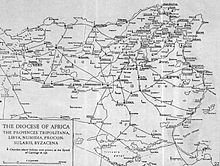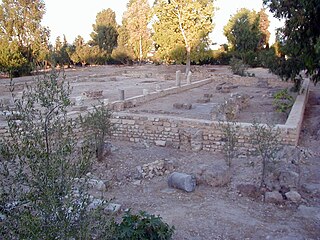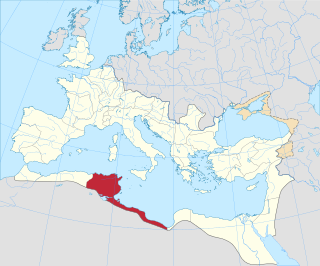
Majorinus was the leader of a schismatic Christian sect in Roman North Africa known as the Donatists.

Majorinus was the leader of a schismatic Christian sect in Roman North Africa known as the Donatists.
Very little is known of his early life, as Donatist writings were mostly destroyed in the following years. What we can garner of his life and beliefs is accessed through what his enemies said against him. He had been a reader or a lector [1] in the church at Carthage, during the time that Caecilianus had been an archdeacon and Mensurius was bishop. He seems to have also had some domestic office in the household of a Roman noblewoman Lucilla.
In 311 Majorinus was chosen as bishop of Carthage by a council of 70 bishops in Cirta led by Secundus of Tigisis. [2] Secundus was the primate of Numidia and as such was meant to be consulted prior to the appointment of Caecilianus, [3] and this appointment was intended to depose Caecilianus. Caecilianus had been the understudy of the recently deceased Bishop Mensurius considered by many to be a traditor during the Diocletianic Persecution, though Mensurius denied the charges, [4] saying instead that he had hidden Christians and church property. [5] The council, however, held that Mensurius was traditor and that sacraments administered by Caecilianus were thus invalid. [6] The situation was further complicated by the fact that Caecilianus was consecrated by Felix of Aptunga, another traditor. [7] [8] However rather than depose Caecilianus, his appointment created a 300-year-long schism in North African Christendom that would radically shape the intellectual life of Christianity.
Virtually everything we know of Majorinus comes from his enemies, [9] many of whom did not hold back on their condemnation of him.
Optatus claims that a dispute broke out between Lucilla—a woman of high rank and the deacon Caecilianus—who had reprimanded her for touching a relic of a saint. [10] The offence, he claims, had festered and at the accession to the bishopric of Caecilianus, Lucilla joined with the Council of Bishops [11] who Optatus called antichrists and betrayers. [12] he concluded ....the Schism was brought to birth by the anger of a disgraced woman, was fed by ambition, and received its strength from avarice [13] He describes Majorinus:
"Majorinus, a member of the household of Lucilla----at her instigation, and through her bribes----was consecrated Bishop by Betrayers, who in the Numidian Council had (as we have already said) acknowledged their crimes and granted pardon to one another. It is, therefore, clear that both the Betrayers who consecrated, and Majorinus who was consecrated, went forth from the Church." [14]

In Church History Eusebius continues the story of the bribes.
Augustine was scathing of Majorinus [15] His elevation to bishop was a Wicked Crime of Frenzied Discord [16] For Augustine the chief evil of Majorinus was his schism with the Church. He wrote of the Donatists in an epistle:
"It is better indeed that men should be brought to serve God by instruction than by fear of punishment or by pain. But because the former means are better, the latter must not therefore be neglected.... Many must often be brought back to their Lord, like wicked servants, by the rod of temporal suffering before they attain the highest grade of religious development.... [17] "
Although he was the first leader of the Donatists church, a significant event in the Early African Church and resulting in the formation of doctrinal authodoxy for the Catholic portion of the church, Majorinus seems to have been little more than a puppet for the rigorists. He had been a fairly low ranking clergy thrust into the dispute that had been raging for some time. This, a lack of theological output, [18] and the relatively short tenure of his leadership had reduced his actual impact on history.

Pope Miltiades, also known as Melchiades the African, was the bishop of Rome from 311 to his death on 10 or 11 January 314. It was during his pontificate that Emperor Constantine the Great issued the Edict of Milan (313), giving Christianity legal status within the Roman Empire. The pope also received the palace of Empress Fausta where the Lateran Palace, the papal seat and residence of the papal administration, would be built. At the Lateran Council, during the schism with the Church of Carthage, Miltiades condemned the rebaptism of apostatised bishops and priests, a teaching of Donatus Magnus.

Donatism was a Christian sect leading to a schism in the church in the region of the Church of Carthage, from the fourth to the sixth centuries. Donatists argued that Christian clergy must be faultless for their ministry to be effective and their prayers and sacraments to be valid. Donatism had its roots in the long-established Christian community of the Roman province Africa Proconsularis and Mauretania Tingitana, in the persecutions of Christians under Diocletian. Named after the Berber Christian bishop Donatus Magnus, Donatism flourished during the fourth and fifth centuries. Donatism mainly spread among the indigenous Berber population, and Donatists were able to blend Christianity with many of the Berber local customs.
Ex opere operato is a Latin phrase meaning "from the work worked" that, in reference to sacraments, signifies that they derive their efficacy not from the minister or from the recipient, but from the sacrament considered independently of the merits of the minister or the recipient. According to the ex opere operato interpretation of the sacraments, any positive effect comes not from any human worthiness or faith, but from the sacrament as an instrument of God.

Donatus Magnus, also known as Donatus of Casae Nigrae, was the leader of a schismatic Christian sect known as the Donatists in North Africa, Algeria. He is believed to have died in exile around 355.

Traditor, plural: traditores (Latin), is a term meaning "the one(s) who had handed over" and defined by Merriam-Webster as "one of the Christians giving up to the officers of the law the Scriptures, the sacred vessels, or the names of their brethren during the Roman persecutions". The word traditor comes from the Latin transditio from trans (across) + dare, and is the source of the modern English words traitor and treason. The same root word, with a different context of what is handed to whom, gives the word tradition as well.

Optatus, sometimes anglicized as Optate, was Bishop of Milevis, in Numidia, in the fourth century, remembered for his writings against Donatism.
Mensurius was a bishop of Carthage in the early 4th century during the early Christian Church.
Caecilianus, or Caecilian, was archdeacon and then bishop of Carthage in 311 AD. His appointment as bishop led to the Donatist controversy of the Late Roman Empire. He was also one of only five Western bishops at the First Council of Nicea.

The Archdiocese of Carthage, also known as the Church of Carthage, was a Latin Catholic diocese established in Carthage, Roman Empire, in the 2nd century. Agrippin was the first named bishop, around 230 AD. The temporal importance of the city of Carthage in the Roman Empire had previously been restored by Julius Caesar and Augustus. When Christianity became firmly established around the Roman province of Africa Proconsulare, Carthage became its natural ecclesiastical seat. Carthage subsequently exercised informal primacy as an archdiocese, being the most important center of Christianity in the whole of Roman Africa, corresponding to most of today's Mediterranean coast and inland of Northern Africa. As such, it enjoyed honorary title of patriarch as well as primate of Africa: Pope Leo I confirmed the primacy of the bishop of Carthage in 446: "Indeed, after the Roman Bishop, the leading Bishop and metropolitan for all Africa is the Bishop of Carthage."
Secundus of Tigisis was an early church leader and primate of Numidia. He was a leading organiser of the early Donatist movement in Carthage.
Felix, Bishop of Aptunga, in proconsular Africa was a 4th-century churchman, at the center of the Donatist controversy. Felix was one of those who consecrated Caecilian as Bishop of Carthage in 311 A.D. This act led to a major schism in Early North African Christianity.
Maximian of Bagai was a 5th century bishop of Bagai in Roman North Africa. His life shows the extent that the religious schism in Roman North Africa could become violent.

Purpurius was a Donatist bishop from 305 to 320 AD, who was instrumental in establishing the Donatist movement of Roman North Africa.

Gaguari is a former diocese of North Africa and since 1933 a titular bishopric. The location of the former diocese is for the moment unknown. Under Roman hegemony, the bishop belonged to the province of Byzacène. This province was located in North Africa. The exact location of Gaguari can not be determined for the current state of research. However, everything leads us to believe that the bishopric site localizes to the current Sahel of Tunisia.
Parmenian was a North African Donatist bishop, the successor of Donatus in the Donatist bishopric of Carthage. He wrote several works defending the rigorist views of the Donatists and is recognized as "the most famous Donatist writer of his day", but none of his writings have survived.
The Second Council of Cirta was a conference of Bishops, held in June 412, at Cirta in Roman North Africa, and was debated between the Catholics led by Augustine and the Donatists led by Silvanus of Numidia. It is notable as the origin of the Catholic dogma that "There is no salvation outside the Catholic Church".

Petilianus was an eminent Donatist of the 5th century Roman North Africa, who is known to history through the letters he wrote to the Catholic Bishop Augustine of Hippo and discourses in Augustine's replies. Although most of what we know of him comes from Augustine, his main theology seems to have been "that the true church was only composed of those who were repentant."
The First Council of Cirta was a synod of bishops called by Secundus of Tigisis, the primate of Numidia in AD 303 or 305. It took place in the city of Cirta.
Donatus of Bagaï, also known as Donatus of Aurasium, was an ancient Donatist bishop and martyr whose life and actions played a significant role in the complex religious landscape of 4th century Numidia. Despite being primarily known through hostile reports, notably found in Optatus' "Contra Parmenianum Donatistam" Donatus of Bagai left a lasting impact on the Donatist movement.

Marculus of Thamugadi or simply Marculus was a prominent bishop and Christian martyr venerated by the 4th-century North African Donatist Church.